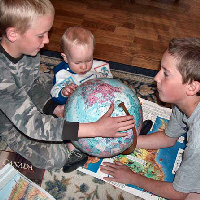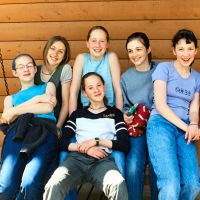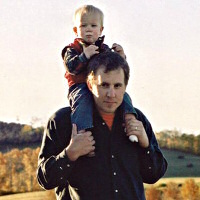SOCIALIZATION:
 "the process by which a human being, beginning at infancy, acquires the habits, beliefs, and accumulated knowledge of his society through his education and training for adult status." - Webster's dictionary
"the process by which a human being, beginning at infancy, acquires the habits, beliefs, and accumulated knowledge of his society through his education and training for adult status." - Webster's dictionary
Habits
It is unlikely that any responsible citizen would automatically take "habits" to mean any and all habits. There are many habits our society would consider ills; habits that hamper personal development and negatively affect the quality of life for individuals and those around them. Instead we are working toward "good" habits: work habits, manners, sportsmanship, caution, respect,....
Beliefs
Many beliefs are held generally by our culture, regardless of race or creed. Justice, equality and a code of human rights are impressed upon our children at an early age by the way we live and by the ways in which we discipline them.
Some parents choose to raise their children without a spiritual belief system, allowing them to "make their own decisions" when they grow up. Most are aware that "no belief" simply means undirected belief, often with serious consequences. Every child will believe in something; responsible parents will develop and share their own beliefs, assuring that their children face life with a firm footing.
Accumulated Knowledge
We must consider what knowledge we wish our children to have. Is it important to the development of their character that they be familiar with every popular television program? Will they be better equipped to enter the work force if they know all the rock music stars and the top ten listings on the charts?
We don't have to hide our children from the world; but life is short, especially childhood, and we may as well have them spend their time learning valuable work skills, learning manners, and developing character.
Even though they think it's taking forever to grow up, their time is limited; and the question is, "for what will you have them use their time," and "what will you eliminate from their life to give time to the priorities." It seems a poor choice to simply throw them into a group of people their own age and hope they'll learn something of lasting value.
Institutional/peer socialization vs. Family socialization
 If socialization involves learning habits, we must be very concerned about the degree to which peer groups foster conformity. It is very important that wherever possible, our children should be experiencing people who demonstrate habits that are desirable. If they are immersed in a world of good habits, they will reflect this world. If most of their time is spent with people with poor habits, they will be likewise affected. If we are talking about habits, or any other aspect of socialization, we must be very careful about who spends time with our children. It is only in the past few years that our culture began to segregate children into groups by age. When my father went to school, he was constantly amidst children aged 6 to 16. There was more opportunity to emulate older children and feel responsible for younger ones. Where for centuries the family (the classic cross-age unit) has been the primary mode of socialization, unfortunately our limited experience in recent history has convinced us that a student needs a same-age peer group to be properly socialized. Thousands of years of history refute this notion. Learning to socialize within the context of the family demands that each member become a giver rather than a taker. Nowhere is this more evident than in the parents. They start out as relatively selfish individuals, but by the time they have changed and fed babies in the middle of the night, cleaned up after and cared for the sick, had most of their prized possessions lost or broken, and suffered with every suffering of their children, they have grown in humility, generosity, and love. A child generally will not grow to the same extent, but nonetheless, simply living and learning within the context of a family will teach abundant character lessons the peer groups don't even know exist. Quite contrary to the message of our culture is the prayer of St. Francis: "...For it is in giving that we receive, it is in pardoning that we are pardoned, and it is in dying that we are born to eternal life." Consider: Who will teach respect for parents and other adults? Who will teach the importance of service to others without personal gain? Who will teach the value of human life and the importance of protecting the very young and the very old? This socialization will not come from the typical peer group. The negative competition associated with being part of a peer group serves to create individuals who have learned to look after themselves.
If socialization involves learning habits, we must be very concerned about the degree to which peer groups foster conformity. It is very important that wherever possible, our children should be experiencing people who demonstrate habits that are desirable. If they are immersed in a world of good habits, they will reflect this world. If most of their time is spent with people with poor habits, they will be likewise affected. If we are talking about habits, or any other aspect of socialization, we must be very careful about who spends time with our children. It is only in the past few years that our culture began to segregate children into groups by age. When my father went to school, he was constantly amidst children aged 6 to 16. There was more opportunity to emulate older children and feel responsible for younger ones. Where for centuries the family (the classic cross-age unit) has been the primary mode of socialization, unfortunately our limited experience in recent history has convinced us that a student needs a same-age peer group to be properly socialized. Thousands of years of history refute this notion. Learning to socialize within the context of the family demands that each member become a giver rather than a taker. Nowhere is this more evident than in the parents. They start out as relatively selfish individuals, but by the time they have changed and fed babies in the middle of the night, cleaned up after and cared for the sick, had most of their prized possessions lost or broken, and suffered with every suffering of their children, they have grown in humility, generosity, and love. A child generally will not grow to the same extent, but nonetheless, simply living and learning within the context of a family will teach abundant character lessons the peer groups don't even know exist. Quite contrary to the message of our culture is the prayer of St. Francis: "...For it is in giving that we receive, it is in pardoning that we are pardoned, and it is in dying that we are born to eternal life." Consider: Who will teach respect for parents and other adults? Who will teach the importance of service to others without personal gain? Who will teach the value of human life and the importance of protecting the very young and the very old? This socialization will not come from the typical peer group. The negative competition associated with being part of a peer group serves to create individuals who have learned to look after themselves.
Influences upon our children
 I would wish to think that good teachers could make the difference in institutional socialization, but as the following chart reveals, even the best teachers don't compare to peers and media in influencing children.
I would wish to think that good teachers could make the difference in institutional socialization, but as the following chart reveals, even the best teachers don't compare to peers and media in influencing children.
Much change, unprecedented change, has occurred within the past twenty years. A 1960 study:
(Resource: Synthesis by Johnston Company of 18 studies for youth values as listed in Josh McDowell's Research Digest.)
Estimated Shifts in Influences Upon Teens' Values and Behavior (A separate study in 1995) reflected the way things had always been, not just for a hundred years or a thousand years, but always. Parents had always provided the primary influence upon their children. Other influences, based upon the particular era, had come and gone; but the parents remained (quite naturally) the number one influence.
In 1980, for the first time in history, parents were replaced as having the greatest influence upon their children. The peer group took over that position. This means that since 1980, the average North American child has been socialized by his peers. Since 1995, the average child has been socialized by peers and the media. The influence of parents is now third.
How can parents regain this lost influence upon their children? Much of the answer can be found in one word: TIME. The lion's share of a child's time is spent with same-age peers. Even after school and on weekends, parents allow their busy lives to take them away from their children, and allow peers to take what should be family time. The media is every bit as pervasive as peers and perhaps even more powerful. (By more powerful I mean that the media is instrumental in giving peer pressure the influence it now maintains.) Even the person who consciously avoids television or movies would find it difficult to avoid seeing billboards and signs or hearing radios and music.
These two (peers and media) are powerful influences in the 1990's. I repeat: because of their power, the only way for parents to regain the position of primary influence on their children is to spend abundant time with them. This equates to home schooling.
I hesitate to say that home schooling is the only way to socialize your children well, but the purpose of this article to encourage you in the knowledge that home schooling makes the process of child socialization more natural and effective than socializing via home and school. Parents with children in school can effectively socialize their children, but they will have to work very hard at it. In fact, they must eliminate most individual activities, and spend a great deal of their "after school" and weekend time together as a family in order to overcome the immense pressure dealt their children by the media and peers. This is the only way in which these parents will remain the primary influences in their children's lives.
What is the "Real World"? I have heard many say, "my child must live in the 'real world' in order to learn to deal with life."
The first thing this statement does is presume the family is not the real world. This is a serious presumption and perhaps one more way in which the family is being attacked, even from within. The family is in fact a microcosm of the nation. Being the primary element of society, it is what drives and governs that society. For example, if families have strong moral codes, the nation will have a strong moral code; if families focus upon selfless service to others, the nation will focus on service; if families are violent, the nation will be violent. Our nation today is confused because many of our families are confused. If you wish to have your children grow up in the real world, make your family real and together.
 I realize that when some people make the above statement, they mean they want their children to be able to deal with the tough situations that will come up in life by not shielding them from those situations now. Frankly, there is a reason children spend the first 18 years of their lives under the wing of their parents. During this period they are developing, and like a young plant they can be easily harmed. The mind and heart of a child can not take the constant abuse that an adult can handle. The experiences of a child are of overwhelming consequence. If you were to counsel troubled 40 and 50 year old people you would find that virtually all of their problems stem from experiences they had as children. Do not underestimate the effects the "real world" is having upon your children.
I realize that when some people make the above statement, they mean they want their children to be able to deal with the tough situations that will come up in life by not shielding them from those situations now. Frankly, there is a reason children spend the first 18 years of their lives under the wing of their parents. During this period they are developing, and like a young plant they can be easily harmed. The mind and heart of a child can not take the constant abuse that an adult can handle. The experiences of a child are of overwhelming consequence. If you were to counsel troubled 40 and 50 year old people you would find that virtually all of their problems stem from experiences they had as children. Do not underestimate the effects the "real world" is having upon your children.
Just as a young plant does best if started in a greenhouse, then set outside for short periods of time, but then drawn back into the protection of the greenhouse; a home schooled child does best given the security of a loving home from which the world may be entered into for short periods. In this way the peer group has no power, because the child can live quite well without it, apart from it.
Incidentally, none of us here, live in the "real world." If you want to experience the "real world" it may be necessary to immerse yourself in the slums of New York, or run your business amidst the organized crime of Chicago, or care for the dying in the stinking streets of Calcutta. We all are sheltered.
What is the purpose of socialization? To become socialized is to become capable of relating to other people by virtue of manners, attitude, and action: Fear of rejection by one's peers is a sign of dependency, not socialization. Selectivity or avoiding interaction with undesirables is elitism, not socialization. Involvement in questionable peer-driven activities is a sign of capitulation, not socialization.
The successfully socialized individual is one who can be open to all people without being manipulated by them. The successfully socialized individual is one who has the confidence to stand for what is right in spite of rejection; to bear burdens or difficulties with hope.
